Is it possible to place a refrigerator near a gas pipe: the subtleties of safe placement of equipment
Residents of apartment buildings and owners of their own homes often wonder whether it is possible to place a refrigerator near a gas pipe and whether such a neighborhood is safe. How to arrange your kitchen space so that there are no problems in the future.
The question of the proximity of a refrigerator and a gas pipe is often found in various forums on repair, construction and home improvement. If it’s clear with a gas stove that the refrigerator needs to be located as far away from it as possible, then what about the gas pipe? What problems can it cause and what do experts think about this?
The content of the article:
Features of the refrigerator
If we talk about whether it is possible to place a gas pipe behind the refrigerator, first of all, you need to analyze all possible hazards and risks when operating refrigeration equipment.
Additionally, it would be useful to consider a short refrigerator operating principle. This will help in identifying possible problems.
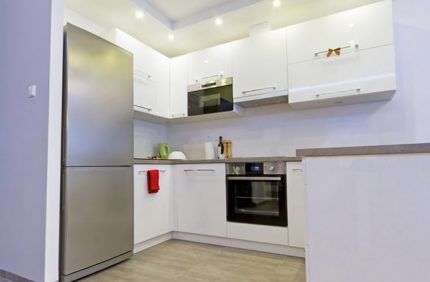
Almost any modification of the refrigerator is designed in such a way that its operation uses freon gas, which, passing through the heat exchanger system, changes its state of aggregation. Due to this, the pressure and temperature of the gas decrease, and the temperature in the refrigeration chamber itself also drops.
At the same time, thermal energy is released outside, then the temperature of the refrigerant gradually increases and it is again sent to the compressor of the device.
Risks of proximity of a refrigerator and a gas pipe
Having considered the principle of operation of the refrigerator, we can name several main details that you need to take a closer look at. Considering that a heat exchanger is involved in the work, compressor, evaporator, certain risks may arise.
Consequently, you should approach the choice of a place for installing equipment more judiciously and carefully, if possible, adhering to certain recommendations of specialists.
During heat exchange, the system gives off heat, which is why the walls of the refrigerator can become quite hot. This depends on the make and model of the equipment. In addition, the operation of the compressor, which charges freon and forces it to move through the system, is impossible without electricity.

As a result of operation, two danger factors arise. Therefore, let’s take a closer look at what you should pay close attention to:
- Heat transfer through the walls. For some types of equipment, temperatures can reach quite high values. Manufacturers, arranging test drives of equipment, recorded an abnormal increase in temperature, up to 50-60 degrees. The indicators are high, given the special location of the equipment in an apartment or house. An increase in temperature to such levels is directly associated with malfunctions in the operation of equipment parts.
- Electricity itself is dangerous.Exposed wire, sparks and shorts from faulty components can transfer current to the pipe. A short circuit in the wiring of a refrigerator that is located close to the gas main can theoretically lead to a fire or voltage supply to the gas pipe.
Are the presented risks really dangerous when operating refrigeration equipment installed near a gas pipe? What exactly can you encounter in everyday use?
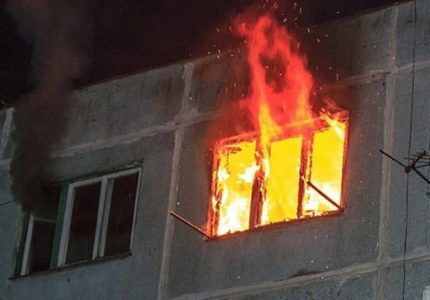
Possible consequences of such a neighborhood
Let's assume that the refrigerator is located close to or close to the gas pipe. What could happen in this situation?
Firstly, there is not enough air flow to operate the refrigeration equipment itself. If you look at the operating instructions, it states that for normal operation it is necessary to leave a ventilation gap.
If this is excluded during installation, the equipment may quickly fail and, as a result, costly repairs. Although some equipment manufacturers do not have such recommendations, due to the peculiarities of the design itself.
Secondly, if the compressor is faulty, the latter may overheat, followed by a short circuit and heating of the gas pipe. Gas is known to pose an increased danger. Overheating of the compressor will lead to excessive heating of the refrigerator walls.
According to experts, if we consider a possible increase in the temperature of the walls, the indicators are unlikely to exceed 60 degrees (research from equipment manufacturers also suggests this). This is not even an average, but a maximum.And even if we take into account that the wall will be located at a distance of 20-40 mm from the pipe, this factor will not be able to somehow affect the gas pipeline system.
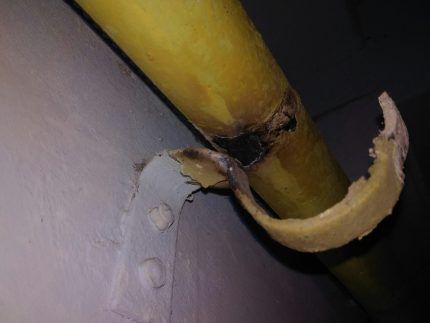
There is no danger even with full fit. Heating the pipe is possible and real, but no harm will come from it, with some exceptions. With constant exposure to elevated temperatures, even if not 60 degrees, but only 30-40, the paint coating of the pipe will be exposed to the effects. Therefore, the maximum that threatens in this case is the need painting pipes.
Thirdly, a refrigerator installed close to it may fail and short-circuit the pipe. A very common reason why fires occur in apartments is a malfunction of the compressor or wiring in the refrigerator. Although in this case, the opinion of experts is different. Even if a bare cable or spark hits the pipe, there is no danger.
This point of view is supported by a number of reasons:
- Gas pipes are made of metal and go into the ground, so upon contact with an electrical wire, a banal phase grounding will occur. Even if the machine installed on the meter does not work, the phase will be grounded and, as a result, does not pose any threat to humans.
- Suppose if the underwater cable is rubber and it gets hit by a bare cord or a spark from a faulty refrigerator, what will happen in this case? Most modern gas stoves are connected with a protective neutral wire, so there is no danger.
- If the stove is working properly, the connections are sealed, if the cable is broken, there is a spark or other problems with the refrigeration equipment, there is no danger to the consumer. Except in cases where electric shock occurs directly from a faulty device.
On the forums you can find a lot of rather contradictory information. And, often, the opinions of ordinary users differ from the statements of experts. They take a different point of view, and here's why.
Most of the housing stock in the Russian Federation was built during the Soviet era. At that time, grounding of gas pipes was not so widespread. In view of this, many residents of high-rise buildings and the private sector, in order to reduce consumption and lower electricity meters, use gas pipes for unwinding, throwing a zero on them.
And the standards for wiring around the house were somewhat different, so partly the statements of ordinary citizens may be valid.
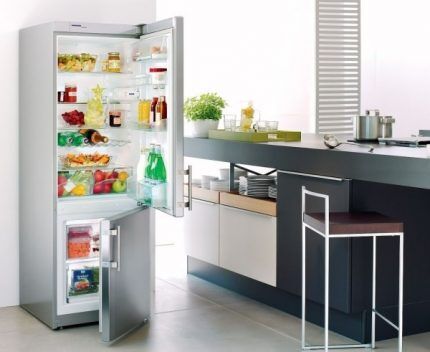
Because of this, there is a danger of not only a fire, but also an electric shock to a person. Therefore, a refrigerator installed closely can simply give you an electric shock, and if current flows from it to the pipe, then it is likely that a fire may occur. In this case, you should think about whether it is worth endangering the health and life of yourself and your loved ones.
As for the statement about insufficient ventilation of the space between the refrigerator and the wall, there is some common sense in this.For the normal operation of most refrigerators, it is extremely important to ensure normal air flow to cool the walls.
At the same time, with the development of technology, the production of a new type of refrigeration equipment is moving, for which it does not matter at all where it will be placed, it does not require sufficient air passage, etc.
An example of this is closed-type refrigerators, which are mounted in kitchen units and represent a single “composition” with other kitchen appliances. Therefore, here you need to pay attention to what type of refrigerator you plan to install.
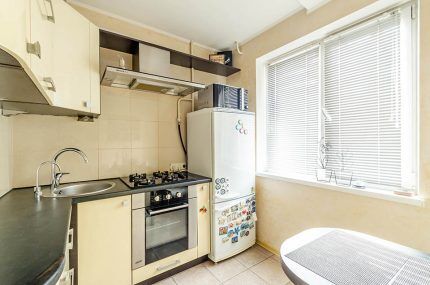
There are also many comments on the forums that inspection bodies or inspectors often frighten residents with the danger of such placement, literally threatening them with fines and turning off the supply of blue fuel. Of course, there is no legislative responsibility in this regard for consumers, but, nevertheless, no one needs unnecessary proceedings.
The story of one of the Moscow high-rise buildings seemed relevant. Complaints were filed against the owner of the apartment, and then statements were filed in court because of the noise the refrigerator makes. It sounds strange and ridiculous, but the complaints were not unfounded.
During numerous inspections, including with the involvement of local inspectors, it was found that the owners, while updating the interior, installed the refrigerator close to the gas pipe. Due to a faulty compressor, at the time of startup and operation, the latter transmitted vibration to the gas pipe.Subsequently, the noise and roar from the operation of the refrigerator bothered all the neighbors in the riser.

The situation is not pleasant, but during the court hearing the owner of the apartment was obliged to correct the situation. As soon as I moved the refrigerator away from the pipe, the noise disappeared. At the same time, the resident himself did not feel any discomfort.
Read about other causes of noise and vibration of gas pipes in this material.
As you can see, the proximity of the refrigerator and the gas pipe does not pose any danger; you just need to maintain a distance, monitor the serviceability of the equipment, and repair any breakdowns in a timely manner.
Advantages and disadvantages of this arrangement
To fully appreciate the pros and cons, you should consider what difficulties and conveniences you will encounter.
First, let's define the advantages:
- The ability to place a refrigerator and gas pipe in your kitchen according to your preferences, focusing on interior design, etc. It is not uncommon that the kitchen layout is done at the expense of simple safety rules.
- Ease of cleaning the room. By installing the refrigerator at a short distance, it is possible to reduce the area for the accumulation of dust, dirt and other debris.
Oddly enough, we could not find more advantages. As mentioned above, only compliance with the rules for installation and use of equipment can guarantee safety during its operation.
Next, let's look at the disadvantages:
- difficulty in maintaining equipment;
- placing the refrigeration equipment too close to the wall creates incorrect conditions for its operation;
- in some cases overlapping gas valve is located behind the refrigerator, so it does not allow you to shut off the gas supply, and even in the case of a visit from a gas service employee, you will have to explain why there is no free access to the gas tap.
Often, inspectors or gas workers refer to the fact that it is prohibited in principle to close the gas system for access with foreign objects. However, they do not provide precise wording or references to laws or acts.
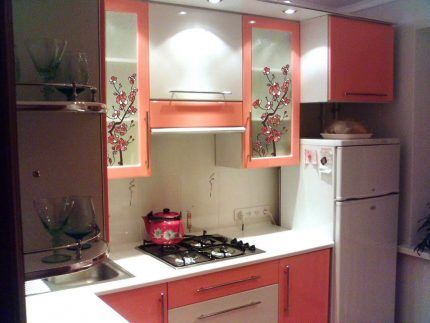
Having studied this issue, we also did not find clear concepts and requirements for the placement and arrangement of a gas pipe in Russian legislation, except for technical regulations. But it does not say at what distance from the gas pipe the refrigerator is allowed to be placed.
Conclusions and useful video on the topic
When deciding how to properly place a refrigerator, you need to take into account the operating principle of the equipment, since this can directly affect the durability and functionality of the latter:
As you can see, there are no legislative norms and rules regarding the placement of refrigeration equipment close to the gas pipe. According to experts and refrigerator manufacturers, to prevent breakdowns and fires, as well as other problems, equipment must be placed at a sufficient distance.
If it is not possible to leave the gas pipe completely open, a gap of 50-60 mm is allowed. At the same time, we recommend that you ensure free access to the meter and valve in order to avoid unnecessary disputes with inspection authorities.
Do you have your own opinion on this issue? Please share it with our readers in the block below. Tell us if you had to defend such placement with regulatory authorities.
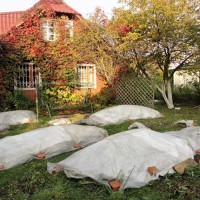


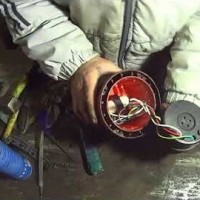
Thank you very much for the complete information presented on your website!!! It is immediately obvious that it was written with deep knowledge of the matter, even SNIPs are all written out and laws that can be referred to if something happens! I am very glad that I found your site!
Where do you see at least one link to a clause in a regulatory and technical document?
What SNiPs, in the field of gas supply there are FNiP, SP 62... (updated edition of SNiP42...), GOST, GOST R, STO. There are no longer SNiPs in their pure form.
Apparently written by an amateur. Internal gas pipes cannot be grounded; insulating connections (flange, coupling or insulating ball valves) are installed at the entrances to houses; the external underground steel gas pipeline itself must be insulated and not connected to the ground. If the soil is corrosive, determined during design, cathodic protection stations for steel gas pipelines (CPS) are installed. VSCs provide a negative potential on a steel underground gas pipeline, about -2.5 volts!!! What kind of grounding to the gas pipeline can we talk about???